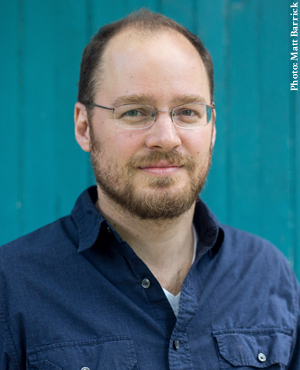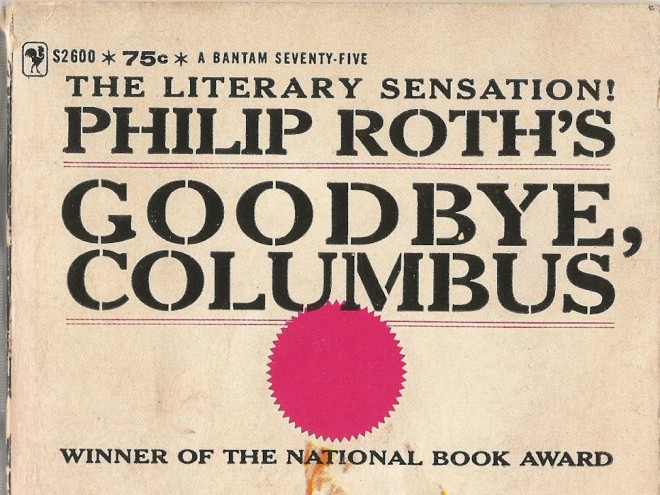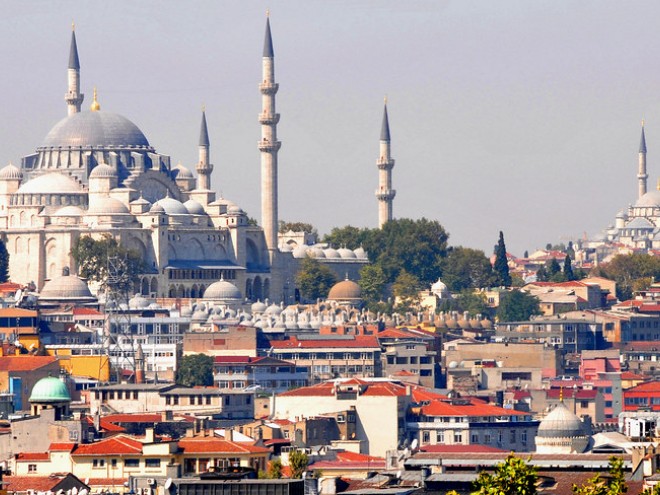Earlier this week, Daniel Torday wrote about contemporary Jewish writers in a world post-Philip Roth and alluding to the Torah in the modern novel. He is the author of the recently published novel The Last Flight of Poxl West and has been blogging here all week for Jewish Book Council’s Visiting Scribe series.
 Almost a decade ago now, after much deliberation, my wife and I decided to take our honeymoon on the island of Dominica. An old friend had honeymooned there and loved it — it was the nature island of the Caribbean, and while we loved the beach and each other, we didn’t want just to lie around in the sun for two weeks. I’d long heard of the island because my grandmother’s cousins, John and Rene, had been living there for almost two decades. John had been a World Bank official. In a lifetime of travel around the world, that was where he had decided to settle. So we’d visit. We would spend a week at an eco-tourist resort on the ocean side of the island, and then spend three days with these cousins on the Caribbean side.
Almost a decade ago now, after much deliberation, my wife and I decided to take our honeymoon on the island of Dominica. An old friend had honeymooned there and loved it — it was the nature island of the Caribbean, and while we loved the beach and each other, we didn’t want just to lie around in the sun for two weeks. I’d long heard of the island because my grandmother’s cousins, John and Rene, had been living there for almost two decades. John had been a World Bank official. In a lifetime of travel around the world, that was where he had decided to settle. So we’d visit. We would spend a week at an eco-tourist resort on the ocean side of the island, and then spend three days with these cousins on the Caribbean side.
We left North Carolina Monday morning after our wedding. After sleeping the whole flight from Miami, I awoke to see where, outside my window, out of the blue sea moaned the wild green island. Dominica is less than ten miles across. The entire island is comprised of a series of volcanoes, as high as forty-seven hundred feet tall. It appeared as if we were two people, in love, flying together directly into a tangle of verdant jungle. Instead we landed, took a vertiginous two-hour jeep ride that tested the limits of my inner ears, taking 145-degree turns on roads that seemed to drop a thousand feet straight into steaming chasms, to a resort called Jungle Bay. Simple huts had been built using the trees cut down to clear a space for the place. Utter beauty. For a week we kayaked, got daily massages together while being plied with fresh fruit juice, ate papaya and mango and pineapple our guide picked and cut while we walked.
Paradise.
A week later we took a taxi to my cousins’ house. The place was called Curry’s Rest. The villa was marked by name on our map. The Caribbean side of the island was tamer. As we turned to the east side of the island, the dramatic roads we’d driven in on calmed, unfurling their view to the low sea off to our right. We looked each other in the eyes, and then out at the sea, tranquil together. Then we were ascending again to Curry’s Rest. After fifteen minutes of increasingly narrow unpaved roads up, my cousin John greeted us. He was in his 80’s, hunched and swarthy with Austrian Ashkenazi blood and Dominican sun. By his side he held a machete.
“Welcome, welcome,” he said. “Put down your bags and I’ll give you the run of the place.” My new wife and I looked each other in the eyes. For a week we’d been massaged, rum-punched to relaxation. Now we were going to see something together. Curry’s Rest was an eighteenth-century villa. To the far right of the building was the original structure. John showed us the red coffee beans just inside its open front, which he’d picked and was sun-roasting on chrome platters. The main house was one open room with scalene ceilings. On the second floor was their bedroom, where John told us his wife was napping, and a guestroom where we would sleep. It did not look like somewhere someone might honeymoon. But it did look like a place where someone might stay put.
After settling our belongings, my wife and I followed John on a tour of Curry’s Rest. The only remaining sugar mill, the reason the island had been settled centuries earlier, sat in ruins maybe a hundred yards from the main house. A Brit named Curry had purchased the place from the Dominican government in the nineteenth century. John bought the place from a Mr. Green. The whole property was almost 300 acres, but if they promised to donate all but fifteen acres of the place to the Dominican government, with the understanding it would remain untouched, they could buy it.
They bought it.
We walked the grounds. My wife went in front and listened, and I felt love — she was paying attention to John for me, and she was paying attention because she was interested. Her gentle generous curiosity had brought me to her, and here it was on display. My octogenarian cousin slapped his machete into coconuts and lifted them for us to taste. He was hunched and bald, five feet tall, but he was an elderly ball of kinetic energy. We went back to the house and napped — neither my wife nor I had the energy to keep up with him — and that evening, as the sun cast pink light over the tops of the trees, we drank rum punch. Rene came to join us. She was suffering the early stages of Alzheimer’s disease, John had explained as we walked.
“You might not notice it,” he said. “Or you might.”
Now we sat on the porch. The door to the large main room of the house was wide open. A bat swooped into the house. I looked at my new wife to see if she had noticed. She had. Her eyes grew wide to match mine.
Another bat swooped into the room. Two more flew out. Neither of my elderly cousins seemed to notice.
We drank our rum punch, which was twenty-three times as good as what we’d had at our resort. My wife and I both let our eyes pass over Rene. We smiled at her and she smiled back. She was slight, with a head of luminous grey hair. We were eight days married. Our love was big and present, like you could touch it. It wasn’t something you could forget if you tried. Across from us was a married couple, isolated in the jungle while one lost her memory. Rene had left her home in Prague at the outbreak of World War II for a safe haven in London. That was where she had met John, who had escaped Austria under similar circumstances. I’d long wanted to hear the story. I asked Rene if she would tell us. She smiled and said nothing.
“When we met it was 1941,” John said. “We were living in a big group home south of London, full of East European refugees. We’d only known each other a month when I was called up for service.” My wife and I had been dating on and off for nearly eight years. We loved each other something fierce. But it hadn’t always been easy. Love never is. For a couple years we were broken up. By some luck, a year after I moved to a place in Fort Greene, she did, too. On September 11, though we weren’t together, right after I arrived at my office on 55th Street and saw the buildings fall, she was the first person I called. Though we were each dating someone else, we spent that afternoon at a mutual friend’s Midtown apartment, watching the CNN crawl. I loved her even when we weren’t together. One Friday afternoon a year later we ran into each other in Grand Central Station. She’d come back with me to my place. After living together for two years, we were engaged.
“In those days you didn’t always have choices,” John said. “The day I was to head in for service in the British Army, we rode together to the train station. Already we were in love. I asked Rene if she wanted to marry me. She said yes. We’ve been together since.” The two of them were sitting just a couple of feet apart. The sun had now set. We were in that half-light that comes amid the first moments of evening. It was as if the world between us wasn’t real. Bats flitted in and out of the great dark room beside us.
I looked at my new wife. She wasn’t paying any attention to the bats now, either.
“But what I really want to know,” my cousin John said, and we really wanted to know what he really wanted to know, “Is how was that new resort? We’ve heard much about it, but haven’t yet seen it.”
We spent the next hour telling him about the resort. I’d had awful pain in my back when we were sea kayaking and my wife had to do much of the paddling. The highlight had been our long walk up to the boiling lake, where our tour guide, a local man named Jesus, had answered his cell phone at the highest point of the hike, to make plans for with friends for later that week. The lake was obscured by plumes of steam that lifted out of the water. I was afraid of heights, and didn’t like getting close to the edge.
“I got close to the edge,” my wife said.
She had. I’d followed. There I’d seen something I wouldn’t have otherwise: for a couple seconds the steam would lift, and down in the chasm below we could see the gray roiling water. Without her nudge, I’d never have seen it. Maybe this was the truth of love: the spectacular world you’d never see without the person who brought you there.
I reached out and grabbed my new wife’s hand. She looked at me, I guess, but dark had fallen over us on that porch at Curry’s Rest. I wanted to know what my cousins were thinking. I could only make out the shadowy forms of bats flitting in and out of the house. We couldn’t see John and Rene’s faces. We knew they were there, like they knew we were here, the two of us starting out on the years that lay before us, behind them, green mountain jutting from some blue sea.
Daniel Torday’s novella The Sensualist won the 2012 National Jewish Book Award in Outstanding Debut Fiction. Read more about him here.
Related Content:
- Essays: Dating, Love, Marriage
- Ask Big Questions: How Do We Love? by Devan Sipher
Daniel Torday is the author of The 12th Commandment, The Last Flight of Poxl West, and Boomer1. A two-time winner of the National Jewish Book Award for fiction and the Sami Rohr Choice Prize, Torday’s stories and essays have appeared in Tin House, The Paris Review, The Kenyon Review, and n+1, and have been honored by the Best American Short Stories and Best American Essays series. Torday is a Professor of Creative Writing at Bryn Mawr College.



